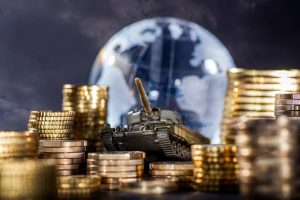
Economic history is a treasure trove of extraordinary theories, intellectual currents and imaginations. And yet, a large section of the history of economic thought has been left in the shadows despite some efforts in recent years by historians and economists. Arab-Muslim economic thought has been one of these forgotten areas. Indeed, the thesis that has prevailed so far is the ‘Great Gap’ of J.A. Schumpeter written in his ‘History of Economic Analysis’ published after his death in 1954. Its influence can still be felt to this day as most historians of economic thought have only repeated Schumpeter’s analysis, excising with the stroke of their quills more than five centuries of economic thought in Islam.
The Review of Religions interviewed Dániel Oláh, a Hungarian economist and editor, who dismantles Schumpeter’s myth of the ‘Great Gap’ and gives us an insight into the work of the famous scholar Ibn Khaldun, considering him as the ‘stepfather of economics.’ Below is the transcript of a conversation between Dániel Oláh and Ahmed Danyal Arif, Editor of the Economics Section for The Review of Religions.
ADA: A few years ago, Professor Oláh, you wrote an article entitled, The Amazing Arab Scholar Who Beat Adam Smith by Half Millennium. I would like to start by asking you, how did you become interested on the topic of Islamic economic thought?
DO: Primarily I was interested in a more plural form of economics with a more honest history of the profession. I would say there is a larger role for ideologies in economics than in natural sciences. Hence, if you would like to think about the society and economy, understanding and being able to make predictions, you need to know heterodox schools and ideas. The need for a wider focus directed me towards this research area.
ADA: You are quoting one of the most seminal works in the field of history of economic thought: History of Economic Analysis written by Joseph Schumpeter. My question is, how did this book seal a false narrative created by neoclassicals economists? Would it be correct to say that Schumpeter’s main mistake was to forget a golden principle in the verification of historical theory i.e., to study world events as though they formed a chain, and to examine this chain too see whether the link can be threaded into its proper place or not?
DO: There is the so-called ‘Great Gap’ in the history of economics. The notion is attributed to Schumpeter, emphasizing the lack of relevant ‘scientific’ economic thinking in 500 years, from the Greeks to Thomas Aquinas. Many researchers proved that this is a false narrative.
Since economics is not a value-free, objective science, the history of economic thought could also be seen through the different lenses of different economists. Some economic schools tend to draw a grand story verifying their current ideas, presenting a historical development path directly resulting in the current state of economics, which is of course the state-of-the-art version of it. This is a way of increasing the legitimacy of a school of thought. When you want to establish the strongest ‘tribe’ of economists, you also need to create a history behind this community.
And sometimes you make the mistake of presentism during this endeavor, meaning an anachronistic and ahistorical use of present-day ideas into the description of past. Which is of course difficult to completely avoid if we want to be able to talk about the history of economics. But presentism may be also turned into a great narrative-educational tool to make historical ideas and thinkers more interesting. I do not state that my article is free of the methodological issues mentioned above, what is more: it is a counter-narrative, to increase pluralism and the competition of ideas in economics.
One of the greatest examples for a highly subjective, presentist way of analyzing the history of economics is offered by neoclassical economics. I examined dozens of books on the history of thought and the majority of them present the ‘story’ beginning with thinkers of early modern times, in some cases with some Greek era introduction. In practice, the Great Gap of Schumpeter exists as an inherent way of neoclassical storytelling.
ADA: Among the neglected figures of history of economics, you mentioned Ibn Khaldun (1332–1406 AD). Who was he and what is so familiar in his thinking to modern economic theory?
DO: As I write in my article, due to the self-created gap in our minds, one of the most unique Islamic thinkers of the Middle Ages is usually left out. Ibn Khaldun, the Andalusian scholar and politician, is usually not a part of mainstream neoclassical textbooks, which mostly imply that economics starts with mercantilism or the Scottish Enlightenment. If I was able to choose a thinker to confute the idea that Adam Smith is the ‘father’ of economics, there may be many more hidden territories in the history of thought which remain undiscovered because of our intellectual convenience.
On the one hand, mainstream economics aims to become a scientific method. On the other hand, to justify itself, it is building the picture of an authoritative hero. This way, Adam Smith became the pop-cultural icon of neoclassical – and neoliberal – thought.
If neoclassicals call Adam Smith the father, then I consider Ibn Khaldun the stepfather of economics. And there are many more step or grandfathers of economics. My article argues that there is scientific thinking about the social world in the 14th century, to some extent even more complex – I try to avoid to say more developed – than that of Adam Smith’s. ‘Such include, for instance, the use of carvings for doors and chairs. Or one skillfully turns and shapes pieces of wood in a lathe, and then one puts these pieces together, so that they appear to the eye to be of one piece’ – writes Khaldun about the division of labor just as eloquently than Smith did with the pin factory.
Khaldun wrote about the supply-demand relationship in the style of Alfred Marshall and invented a version of the labor theory of value among many other things. It is not a coincidence that Ronald Reagan himself referred to Khaldun and also Arthur Laffer considered him a forerunner of supply-side economics. This is, by the way, another prime example of how neoclassical economics forms economic history to justify its existence with ahistorical oversimplifications. That is why I point out that we may just as well call him a Keynesian.
ADA: His thought on the issue of taxation and the link he makes with what seems to be an ‘economic cycle’ is also quite pioneering. Can you give us your thoughts on this and what it means to you?
DO: ‘Money circulates between subjects and ruler, moving back and forth. Now, if the ruler keeps it to himself, it is lost to the subjects’ – writes Khaldun, emphasizing that when a ruler stops spending, business slumps and profits decline as a result of the shortage of capital. Although Khaldun does not support high government involvement in the economy, on the demand side he places a huge role on government spending which later transforms into increased tax revenues. The dynasty is the market of all markets, a central entity on which other smaller markets depend. The government should spend its resources adequately so that people could consume. The interdependent nature of a complex, cyclical economic system – this is an economic message.
But there is another one: according to Khaldun’s cyclical theory, the sovereign is like a living creature with a life-cycle from birth to death. It is important to note that Khaldun does not speak of economics as a science. His economic and sociological analysis serve as a basis of a broad-based theory that describes the life-cycle of societies and civilizations. Complex economic arguments are byproducts here, providing a methodological basis for Khaldun’s historical work. This work emphasizes that the economy is only a part of the social system, resembling to the essence of the term ‘political economy’, as opposed to the practice of economic imperialism.
ADA: And apart from Ibn Khaldun, to your knowledge, are there other Arab-Muslim scholars and/or ideas that have fallen into oblivion?
DO: I agree with John Maynard Keynes in that ‘Practical men who believe themselves to be quite exempt from any intellectual influence, are usually the slaves of some defunct economist’. The task is not only to find these ideas but also to communicate them and form the mainstream with new findings. Al-Ghazali with his version of Gresham’s law is only one example. I am sure Islamic economists could say much more than I in this matter, but in a nutshell, The Gresham’s law is a monetary principle arguing that ‘bad money drives out good money’. People will hand over the ‘bad’ coins rather than the ‘good’ ones, because they want to keep the more valuable ‘good’ coins to themselves. So the more valuable commodity will disappear from circulation.
ADA: In fact, all this reminds me of the importance of seeking knowledge which is repeatedly stressed by the Islamic teachings. I mean your article is testament to that! Do you think this thirst for knowledge is a factor that has played a key role in creating this ‘wealth of ideas’?
DO: Khaldun took it seriously by developing a clear pedagogical philosophy as well. He was writing about educational methods and procedures. Issues of knowledge creation and transfer were of primary importance for him.
He also developed an own, new method of producing reliable knowledge, rejecting earlier traditions building primarily on the authority of the transmitter. He did not accept any historical story unconditionally, without questions. He wanted to know social, economic and political mechanisms so that he could reject the absurd stories of historians. This approach made him one of the first social scientists in the world. He also stated that he was doing a completely new, original, and independent science, which hadn’t existed before. The thirst for knowledge made him achieve that.




Add Comment